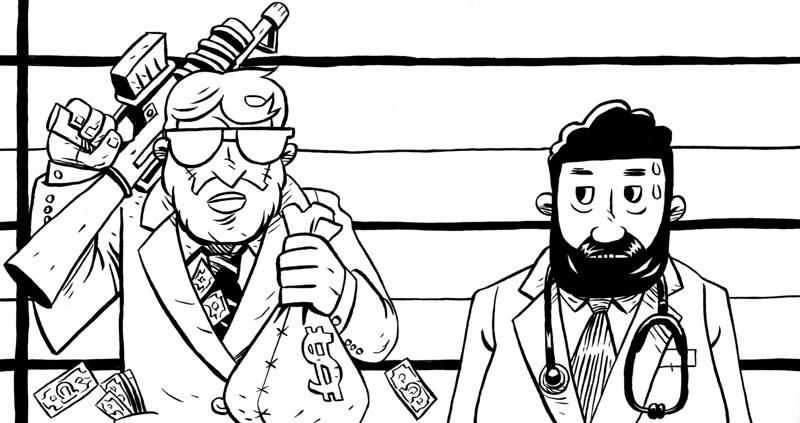by Jules Bentley
Occupational Hazards:
The Bizarre Case of Dr. Victor Alexander
A CLIMATE OF FEAR
It’s difficult to convey just how tight a grip big oil and other chemical industries have on the neck of the Pelican state. The scope of industry control over human life here is hard to believe– so extreme it beggars belief, so far-fetched it defies the pessimism of the gloomiest cynic.
The nickname “Cancer Alley,” coined to reflect the soaring cancer rates in communities near chemical and oil refineries, gives a hint, but it’s only when you start tallying for yourself some of Lousiana’s staggering history of unpunished industrial wrongdoing that you begin to get a sense of how far out the reality is– how far it is beyond reason.
From then ’til now, the song remains the same: while factories profitably poison of the air, water, and inhabitants of Louisiana, anyone seeking to hold the petrochemical industry at all accountable or answerable gets branded “anti-business” and run off, discredited or worse. To contest the interests of industry is to be crushed.
Here and now, in the wake of BP’s destruction of the Gulf of Mexico, it’s been hard for those sickened by the oil and dispersants to find medical help. It’s been hard to find doctors who will seek, let alone admit, any link between a sufferer’s symptoms and the toxins we’ve been exposed to. A climate of fear within the local medical community means tests that might establish what’s killing us go unordered, referrals to specialists are withheld, and patterns within communities are ignored or denied.
THE WHISPERED NAME
There are many horror stories about doctors who defied the oil industry and suffered for it. Doctors have been subjected to punitive audits and investigations, been threatened, and been shot at. Among all these, though, there is one cautionary tale in particular that seems to reverberate down through the decades.
Talking to health professionals about the human consequences of industrial pollution along the Gulf Coast, one name surfaces over and over, even if it’s only mentioned in whispers. It’s the name of a man who fought big oil and paid with his career, his reputation, and his freedom. It’s the name of someone whom prestige and prominence would have seemed to render untouchable, the name of a crusader brought low in spectacular fashion. It’s a name still invoked warningly against any medico foolish enough to seek the truth in a place where only money matters.
The whispered name is that of Dr. Victor Alexander, a renowned toxicologist and a national star in the field of occupational medicine.
In 1982, this Harvard-educated researcher went from being a senior medical official at OSHA to being the Director of Occupational Medicine at Ochsner in Jeff Parish. In 1984, he founded his own ground-breaking environmental-toxin research & testing company in New Orleans’ CBD, a company that made him over $100k a year.
In May 1985, the FBI arrested Dr. Alexander and charged him with a $2600 hold-up of a Canal St. bank.

WHY OCCUPATIONAL MEDICINE MATTERS
Occupational medicine, Dr. Alexander’s specialty, is the crucial branch of medical practice that builds links between workplace hazards and the health problems of workers. If one in three employees who work with carcinogenic materials in a Norco refinery get thyroid cancer, or the rate of miscarriage among people living within 5 miles of the refinery is 20 times the national average, you might be surprised how difficult it is to connect these health effects to the refinery’s carcinogens in a study that will convince government regulators. As we’ve seen in the wake of the BP disaster, the petrochemical industry itself likes to hire these occupational medicine experts. It buys doctors up wholesale, and they churn out proof of industrial harmlessness as fast as their paychecks can carry them.
For the few who don’t accept industry money, establishing causality between the toxins and the toxified requires careful and thorough documentation. It requires sustained, long-term engagement with the affected people, all done in direct and unconcealable opposition to South Louisiana’s biggest power brokers: industry itself, the government toadies industry has purchased, and local media who prefer to print government and industry statements as unchallenged fact.
Dr. Alexander was prominent in his field and earned a reputation as someone unafraid to oppose and expose big business. Throughout the early 1980s Dr. Alexander’s name surfaces time and again within national media, as an expert witness on behalf of poisoned workers suing their unsafe employers, as an authority on brain cancer in petrochemical workers, and as a contributor of articles to scientific journals on the dangers of industrial carcinogens. He was most visible as a public-health specialist in South Louisiana newspapers, where he provided quotes about how pesticides end up in breakfast cereals or why employees of an Exxon plant had such astronomical miscarriage rates.
As head of Occupational Medicine at Ochsner, Alexander worked to make information on workplace deaths and injuries more readily available, conducted free seminars for the public on the links between workplace carcinogens and cancer, and advocated for better mandatory disclosure laws for employers who expose their workers to dangerous chemicals. He also authored numerous papers proving his findings with hard data. Between 1985 to 1990, however, there’s a gap in Dr. Alexander’s history of professional accomplishment, a gap accounted for by prison.
THE HOMESTEAD HEISTS
710 Canal St., once a high-end menswear store where Huey Long bought his pajamas, now host to another Motwani-owned tourist junk shop, was in 1985 a branch of the Central Savings & Loan Association. That particular branch was robbed four times between May and July 1985, a strikingly eventful quarter given that there were only 56 total bank robberies among the state of Louisiana’s 700 or so banks that year.
A lot was odd about the robbery Dr. Alexander was accused of committing. It wasn’t just one of four robberies in a three-month period; it was one of two in two days. The robbery pinned on Alexander took place Tuesday, May 21st, less than 24 hours after another robbery at the same branch. The Monday robber, according to the FBI, was a Florida man who’d just flown into town and was staying at a local hotel, and who robbed the bank on his way to catch a flight out to Dallas.
Why would Dr. Alexander, a man with an absolutely clean criminal record, a man who made over $100k a year, spend his lunch break robbing a bank? It’s true his toxicology firm’s offices at Canal Place One weren’t far from the bank branch. There’s also no doubt the robber shown in surveillance photos bore some physical resemblance to Dr. Alexander. Both were big, bearded brunette white dudes, although side-by-side photographs make clear differences in build, facial features, general girth and even finger length. Dr. Alexander’s legal defense team was eager to bring up these differences via a host of photo identification experts, including former FBI criminal identification analysts, but they weren’t permitted to call these experts during trial.
The robber had been given a dye pack which would have permanently stained his briefcase, clothing and skin, yet Dr. Alexander, arrested three days after the robbery on an anonymous tip, had no dye stains anywhere to be found. In fact, no physical evidence whatsoever was found linking Dr. Alexander to the crime. Based on such shoddy “proof”– a grainy surveillance photo and the changing testimony of a couple eyewitnesses– it’s safe to say that if Dr. Alexander had been a Dow refinery and the bank had been a small Louisiana town, he’d have gone free no problem.
Although he allegedly needed $2600 badly enough to commit a broad daylight bank robbery, Dr. Alexander had no problem immediately posting a $500,000 appeal bond while his lawyers took the case over to the Fifth Circuit on Camp St. The Fifth Circuit didn’t like what they saw, and in April ’85, Dr. Alexander’s conviction was thrown out, due in part to the exclusion of the expert witnesses. According to the official finding of the Court of Appeals, “Review of the record reveals that the prosecution’s case against Dr. Alexander mainly consisted of an in-depth recitation of his sloppy bookkeeping procedures and his habit of visiting night clubs featuring exotic dancers.”
The feds weren’t done with Alexander, however. They retried him, re-convicted him, again without the testimony of the defense photo experts, and his appeal of that conviction was turned down. He served out a 3-year sentence in federal prison, spending a good part of that time filing papers in a battle to retain his medical license.
THE MESSAGE
Dr. Alexander went directly back to work after his release, co-writing a study demonstrating the increased probability in brain tumors for employees of nuclear plants. He has changed the name he publishes under and moved away from New Orleans, but he remains active on the national scene, publishing papers in the journal of Occupational Medicine and testifying before the EPA about regulation of airborne pollutants. Dr. Alexander wasn’t defeated, but our region lost a crucial ally in its struggle against industrial death. What might Dr. Alexander have had to say in the wake of the BP disaster? What additional resources might he have been able to bring to bear if he hadn’t been run out of South Louisiana?
Whatever one thinks of the fishy convictions Dr. Alexander was subjected to, there’s no doubt that the a message was sent, loud enough to resonate across the years: Dr. Alexander’s case and his fate are still discussed today. Michael R. Harbut, MD, MPH, a former chairman of the American College of Chest Physicians’ Occupation and Environmental Medicine section, spoke of the harassment and intimidation many doctors in his field face, especially in South Louisiana.
“In the early 1990s I had called a bunch of cases, I saw patients who were sick from their environment who worked for Dow and DOW Chemical and a couple of the steel mills. In an eighteen month period I had one Blue Cross Blue Shield audit, two Medicare audits, a Michigan Employment Security Commission audit, a USAID Inspector General’s audit, and I was the target of a federal grand jury investigation… The degree of harassment towards physicians is enormous.”
“Many physicians who do work, or potentially could do work, or have knowledge of the area in New Orleans know the story about Victor Alexander. The message is quite clear: Don’t mess around with the petroleum industry.”
Share
Your writing is exceptional. I would love to contribute dollars to your campaign, however I can only offer encouragement. Dr. Alexander is a hero in my esteem, as are the countless other heroes of the US proletariat persecuted through the years by corporate thugs of the Standard Oil descendants, the Seven Sisters (Exxon Mobil, Gulf Oil, Chevron, Royal Dutch Shell, BP, Standard Oil of New Jersey, Standard Oil of California). Their souls are pure, their souls are truly free.